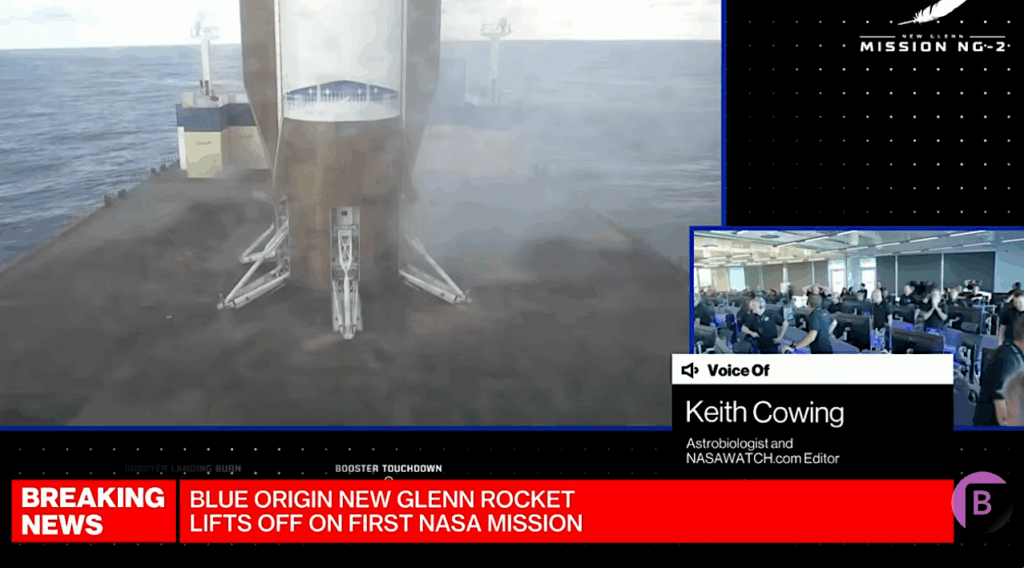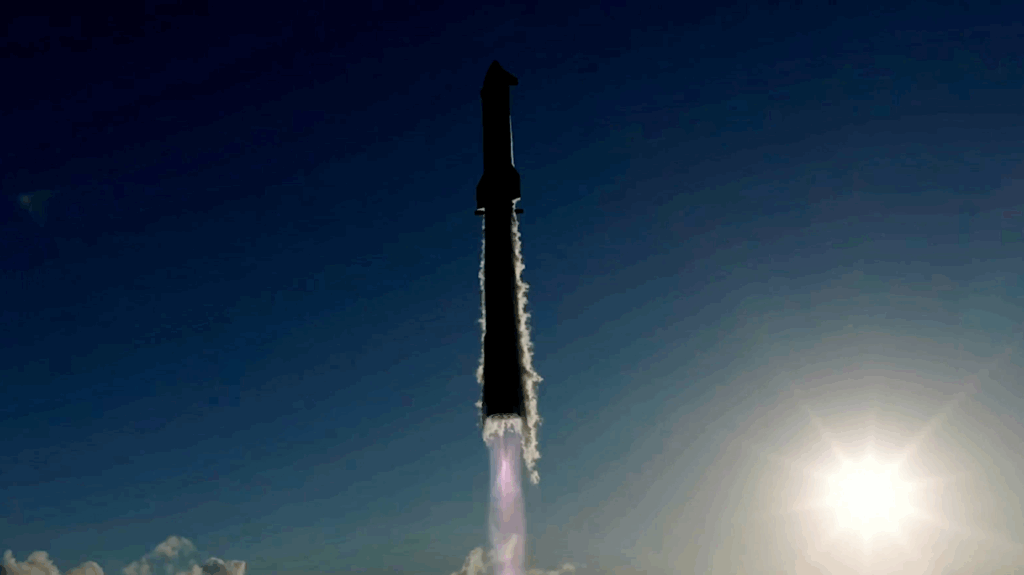Legal Basis For NASA Earth Science and Space Commercialization Activities

 Keith’s note: The next time you read about people on the NASA Transition Team saying that it is not NASA’s job to conduct Earth science research – or wondering why NASA supports space commerce – just remind them: its the law. If they want proof then direct them to “National Aeronautics and Space Act of 1958, Pub. L. No. 85-568, 72 Stat. 426-438 (Jul. 29, 1958) As Amended”.
Keith’s note: The next time you read about people on the NASA Transition Team saying that it is not NASA’s job to conduct Earth science research – or wondering why NASA supports space commerce – just remind them: its the law. If they want proof then direct them to “National Aeronautics and Space Act of 1958, Pub. L. No. 85-568, 72 Stat. 426-438 (Jul. 29, 1958) As Amended”.









It appears the Earth clause was only added in 1984. Strange since NASA was created during the IGY you would think it would have been on the original charter for it, especially given their early work on remote sensing satellites. However, as the saying goes, what Congress gives Congress may take away. The big question is with Senator Mikulski retiring which senators will step up to protect Earth Science at NASA.
The 1984 Authorization Act is the same legislation that added support for “the fullest commercial use of space,” which has supported the current commercial crew and cargo programs and the ISS National Lab.
Both sections were recodified in 2010 after, what, 26 years on the books and are still good law – thanks for pointing this out Keith, it’s not like this is a new mission for NASA.
The 1957-58 IGY was very influential in formulating the original National Aeronautics and Space Act of 1958 but given that NASA was formulated out of NACA and the political tensions of the time, the original Space Act of 1958 was very focused on those priorities but has been updated a number of times since then.
So, yes, Earth science has been part of NASA’s mission for a long time and is one of its core competencies (as well as a fertile area for significant international partnerships – which Keith can attest is part of the rationale for the ISS.)
Yes. For reference here is the original act.
http://history.nasa.gov/spa…
Sec. 102 (c)(4) would apply to Earth Sciences.
“The establishment of long-range studies of the potential benefits to be gained from, the opportunities for, and the problems involved in the utilization of aeronautical and space activities for peaceful and scientific purposes.”
Earth observation fits under it which is why it was the fourth of the five national space goals in President Kennedy’s famous “Moon Speech” on May 25, 1961.
https://www.jfklibrary.org/…
“Fourth, an additional 75 million dollars–of which 53 million dollars is for the Weather Bureau–will help give us at the earliest possible time a satellite system for world-wide weather observation.”
So yes, it does go back a long way, to the very founding days of NASA with the launching of Tiros in 1960 the first Earth observation satellite.
https://www.nasa.gov/multim…
“one OR more”
Note that human exploration of space is not explicitly mandated in the Act and therefore requires a separate legislative mandate.
Change the law. Put the money towards space science or give it to NOAA/USGS. Re-focus NASA’s mission. It’s drifted far enough.
The law could be changed. But I think the point is that this law has been in place since 1986. So you can not say it is a result of any drifting or loss of focus in the last 30 years.
It’s been drifting since the end of Apollo. Ironically NOAA and the USGS were created in the 70s. One would think they would have passed Earth science to these two organizations instead of having the overlap.
Yea, the USGS was created in the 70’s alright. The 1870’s. March 3, 1879 in fact. Look it up.
Yes, thank you for supporting my point.
The question is, does the Trump administration want anyone to study climate change? Thier proposal is to shift NASA funding from climate change to exploration. There is no plan to shift funding to NOAA to study climate change. In fact in her announcement of the GOES-R launch NOAA director Kathryn Sullivan was careful to focus on short-term weather forecasting and avoid any mention of the data it would produce for the study of climate change.
In the 1960’s, NASA developed and flew the first weather satellite, TIROS-1. This lead to the first succesful (TIROS) series of weather satellites, the precursor to the current POES program. NASA also developed and flew Nimbus, the ground breaking series of earth observing satellites that laid the groundwork for the Earth Observing System now in orbit. NASA essentially created the discipline of earth observation from space during this decade.
The agency managed to do this while, at the same time, managing to land men on the moon. NASA’s manned spaceflight mission was hardly distracted by earth science then, and the current earth science program is not the cause of it being unfocused now.
Why would that be a good move? Is it because some other agencies can do a better job of documenting climate change? Or because having the research in one place adds some sort of synergy?
NASA has a stunning in-house research capability that would not be easily just ‘moved’ to another agency.
Every layer in the branch, division, office, and center levels has it’s own bureaucracy. You would be consolidating that, and in turn saving money.
The private sector consolidates all the time to maximize efficiency.
Possibly true, possibly not, and I hope you won’t take offense, but my suspicion is that this point is driven less by actual knowledge than by point of view.
There is a dangerous and indeed treasonous hatred of government by many on the right that is often expressed in disdain of any governmental efforts at all. My own experience- admittedly far from Washington and far from science- is that governmental employees are by and large well motivated (although admittedly they have a peculiar way of moving).
There is also a related and apparently ancillary issue that consolidating research has the singular effect of reducing the quality of the research. Research isn’t ‘directable’, in the main.
I’m a climate change doubter, Michael. That means that I want more data, not less. I also want the data to be consistent so that the models can remain reliable. There are others on my side of the aisle who want to stop all research, which is stupid. But, does climate science benefit from being the little knot in the middle of the rope of Congressional and Presidential political tug-of-wars? Let’s let science be science and politics be politics. The truth is that most of the folks I talk to on both sides of this issue are polarized without knowing any more about the science than I do. In case you hadn’t noticed, politics is a poor trumpet for truth.
I’ve had almost 2 decades at NASA. It comes from experience with dealing with each layer of the bureaucracy every time I have to complete a project. Lately it’s been Orion. Every time we move to a new project we re-invent the wheel. For example each program institutes a completely new configuration management system with a new bureaucracy to support it…every bloody time. After each project we all compile what we learned and mail it off, no one learns anything and we repeat is all over again. All the mistakes from EFT-1 have been repeated with EM-1. I’ve got a lot of stories and examples.
Because saying, “We’re directing NASA to focus on deep space and exploration of the Solar System” and then saying “oh and looking at the Earth” sounds hoky. Say one or the other…not both. Or put together a plan to transition them out of it, or reword officially and dissolve NOAA.
They delegate stuff like this to academia now…right?
There has been no “drift”. The idea that Earth Science took away resources from Spaceflight over time is at best a myth, happily adopted by spaceflight focused people anxious to justify stealing from Peter to pay Paul, anxious to say “Aha, I knew it, we had money all along!” Rather than fix one’s own house, people love to point fingers elsewhere. At it’s worse this idea it’s just a lie, as many of those same people encouraging the myth know it’s a lie. They know the facts, the numbers. The percent of the NASA project budgets that have gone to it’s Science arm has been steady (around 35%) since FOREVER. Just as the percent that has been spaceflight has been steady since FOREVER (about 60%).
Lacking reform in NASA and it’s industry relationships, no amount of stealing here or there, least of all from an area just as important as Spaceflight, will get anyone to Mars, or to reliving some Apollo nostalgia. I’d even go so far as to predict that such a redirect if implemented, taking some Earth Science monies and redirecting them to Spaceflight, would ultimately be counter productive to Spaceflight, simply encouraging their worse bad habits.
Consolidation is not stealing. The private sector does it all the time.
There is no “consolidation”.
NASA’s Earth-science funding will not be moved to NOAA.
NASA’s Earth observation programs will not be moved to NOAA.
NOAA own programs are increasingly being legislated with language specifically preventing them from studying long-term climate patterns.
Stop repeating this pathetic lie that these moves are anything to do with “saving money” or “consolidating resources”. They are, and have always been, about undermining climate research, because they don’t like the findings from climate research.
Don’t bother them with the facts, Keith. It’s just annoying.
Yep, I’m told that often as a rule of thumb for many years now.
Note: the Declaration of Policy and Purpose does *not* say anything about human spaceflight being a core purpose of NASA. (Isn’t that interesting!) Sure, there’s an odd reference to “living organisms in space”, but that’s hardly sufficient to hang half of the agency’s budget on.
NASA’s mission as stated in the Space Act is much more science and engineering oriented than the NASA we have today. The human spaceflight cabal took over the agency many years ago.
Laws can be changed. What cannot be changed is the fact that NASA is uniquely qualified to study all components of our biosphere from the advantageous perspective of space. I will argue that no other agency in the world has the end-to-end capabilities of NASA, and some further argue that NASA invented the field of Earth System Sciences. NASA, NOAA, EPA, USGS, NSF, and many state agencies are doing great collaborative work in Earth Sciences – Each agency playing to their missions and strengths, and with some needed overlaps. There is nothing particularly wrong here.
I suspect that the real problem for NASA Earth Sciences (and our sister agencies) is that we produce actionable information. We show imagery of the ozone hole, maps of pollution, etc, and provide evidence for climate change and its effects on our planet. These data are uncomfortable to some.
Back to work now. I got me a very interesting planet to study. There is water, life forms, and other stuff in it….
G
Keith,
You can go back to the original 1958 establishing act.
“(1) The expansion of human knowledge of phenomena in the atmosphere”
Very first thing part of the very first requirement they thought of. Study the atmosphere.
Sorry, Keith. You’re lots smarter than I am, but based solely on the wording that you provided, Earth observation by NASA appears to be optional. To whit…
“(d) The aeronautical and space activities of the United States shall be…”
This does not say “NASA” specifically. It does not even say “Government” specifically. It says, “United States”…a very big organization that includes a lot of players in Government, Business, and Academia, including government agencies like the EPA and NOAA. A strict interpretation of this to mean “NASA” ONLY would mean that NASA should not be delegating any part of any of these tasks to anyone in academia, which you know that they do. Something else it fails to say is that NASA has to be in charge or that the funding has to be funneled through NASA. It just says that the U.S. should do that stuff.
Also, if the word “atmosphere” in sub-heading (1) from this provision means “NASA” (directly), then it also means that all of sub-heading “(3)” means “NASA” (directly), which makes COTS and CCDev entirely illegal.
For that matter, handing off any part of sub-heading “(2)” to the FAA would also be illegal if sub-heading one refers to NASA only.
Of course, NASA does in fact work in concert with NOAA, the EPA, the FAA, and various players in academia and industry on all of this stuff. The balances in those relationships have evolved through time and opportunity…all under the provisions of this law that you’ve sited. More “shifting” would be consistent with current practice and still be legal. Now however, NASA is supposed to be shifting away from LEO activities, right? Shouldn’t LEO Earth observation shift with it? When, K-12 school organizations can build and launch cube sats and small businesses can participate in the Google Lunar XPrize, why does climate research still need NASA to build their satellites for them? No one else needs NASA for that anymore? All of the Government agencies, launch providers, and satellite builders already involved in space-based climate science, through NASA, are already NASA partners anyway and have access to their expertise behind the scenes in a way that is largely unaffected by shifting political priorities…therefore more consistent over time.
If any government agency needs NASA to help them design a sensor tech or give them advise, they can already either call NASA or call Congress and let them call NASA. That’s the only difference we’re actually talking about here. Which one sounds easier to you? Which is more expensive overall?